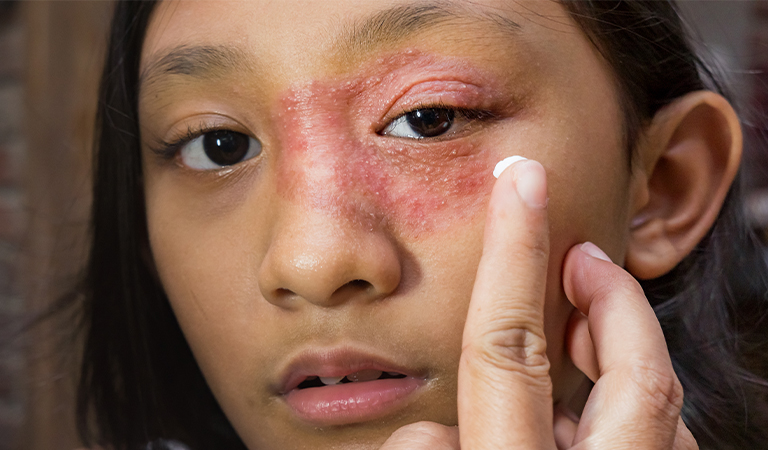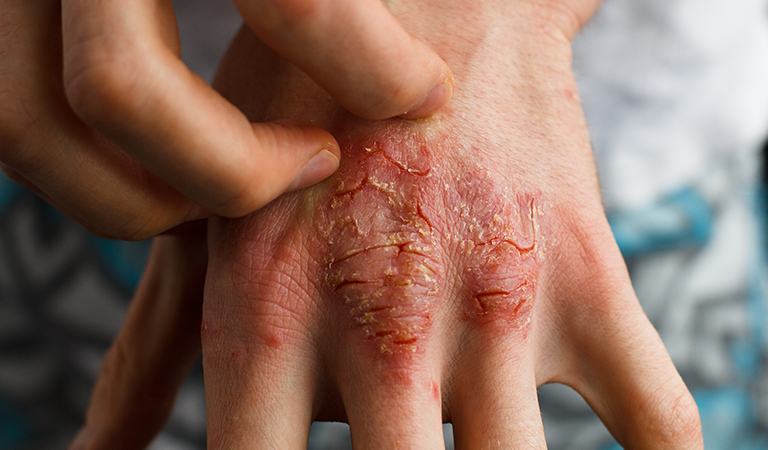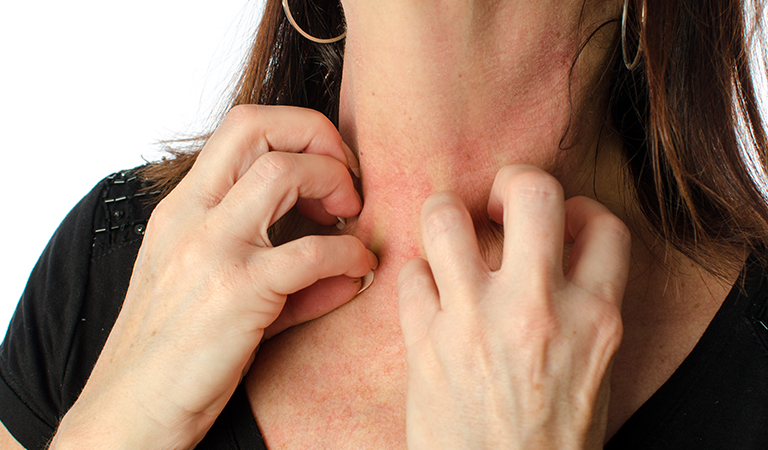Eczema Treatment
If you're searching for effective Eczema treatment in Dubai without side effects, you’re in the right place. Dr. Batra’s has over 4 decades of experience treating various skin conditions, including over XX cases of Eczema.
Our expert team of homeopathic doctors in Dubai and Abu Dhabi will customise the treatment plan for Eczema to your specific needs, combining cutting edge technology with natural therapies to help you deal with your condition.
Homeopathy Treatment and Medications for Eczema
Eczema is a chronic skin condition that causes itchy, red, and inflamed skin. In some types of atopic Eczema, blisters might form. Although Eczema is most commonly associated with children, it can also afflict adults. In some people, asthma and Eczema coexist, and both conditions regularly flare up.
Homeopathy focuses on both treating disease and addressing its underlying causes. Because homeopathic remedies are derived from natural plant sources, they are more effective and completely devoid of adverse effects. Homeopathic Eczema therapy is a holistic strategy that can help prevent further health problems caused by Eczema.
According to a study published in Complementary Therapies in Medicine, homeopathy proved clinically useful in treating Eczema. In a 6-year study of patient outcomes at the Bristol Homeopathy Hospital in the UK, 82% of Eczema patients reported feeling better or significantly better after getting homeopathic Eczema treatment.
It is crucial to remember that the length of time required to treat Eczema varies from patient to patient and is determined by several factors, including the severity and extent of Eczema as well as past treatment methods. However, because homeopathic Eczema treatment has numerous benefits to give to every patient, it is strongly recommended for all conditions.
Advantages Of Homeopathy Medicine For Eczema
- Improves Skin Texture
- Internal Healing Through Oral Medicines
- Treats The Root Cause Of The Condition
- No Side Effects
- Natural and Effective
Why Choose Dr Batra's for Eczema Treatment in Dubai
Dr Batra's is the go-to choice for effective Eczema treatments in Dubai. Here’s why you should choose us for the best homeopathic treatment for Eczema:
Experienced Homeopathic Doctors
Dr Batra's® clinics are staffed by trained homeopaths who are experienced in treating a variety of health conditions including Eczema. Our doctors conduct a 30- to 40-minute in-depth consultation with the patient during which they analyze the patient's physical, emotional, and psychological concerns and correctly diagnose the ailment using the medical science of homeopathy
Global Recognition
Dr Batra's® has a reputation worldwide for providing quality healthcare and has been helping patients positively for 35 years.
Dr Batra's® 3D Skin Analyzer
An advanced 3D skin-specific analyzer that assists the doctor in determining your skin condition, will also be used by the doctors. Following a complete skin assessment, our skin specialist will recommend and build a customized homeopathy treatment for Eczema. To properly manage Eczema, this treatment approach combines homeopathic medicines, a balanced diet, and skincare tips.
Personalized Treatment
Dr Batra's® provides personalized homeopathy treatment based on each individual's specific symptoms and medical history.
Extensive Experience
We have been providing effective homeopathic dermatological solutions for skin related problems for over 35 years now! Therefore, when consulting our expert doctors, you can expect the best solutions customized to your skin problems.
Understanding Eczema
Risk Factors of Eczema
Eczema is a chronic skin condition that can be triggered by various factors. The following are some of the known risk factors for Eczema:
- People with a family history of Eczema, asthma, or hay fever are more likely to develop Eczema
- Eczema is most common in infants and young children, but can also occur in adult
- Eczema is more common in men than women
- Dry, cold weather can worsen Eczema symptoms, while humid weather can improve them
- Stress can worsen Eczema symptoms, although it is not clear how stress and Eczema are linked
- People with a dysfunction of the skin barrier are at a higher risk of developing Eczema.
- Exposure to certain irritants such as soaps, detergents, and certain fabrics, as well as exposure to allergens such as dust mites, animal dander, and pollen, can worsen Eczema symptoms
Above mentioned skin problems can easily be treated and will enhance the glow with Dr Batra’s® Homeopathic MediFacial without any side effects.


A family history of eczema, asthma, or hay fever

Dry skin

A personal history of allergies

Stress

Exposure to certain irritants or allergens, such as soaps, detergents, or pollution

Hormonal
changes

Exposure to certain foods, such as cow's milk or eggs

Infections
It is important to note that not all people with these risk factors will develop Eczema, and some people without these risk factors may still develop the condition.
Symptoms of Eczema
Eczema is a skin condition that causes itchy, red, and inflamed skin. Although it can occur at any age, it is most commonly found in infants. Eczema symptoms vary depending on the person's age as well as the type of Eczema they have. As a result, Eczema signs and symptoms differ from person to person.
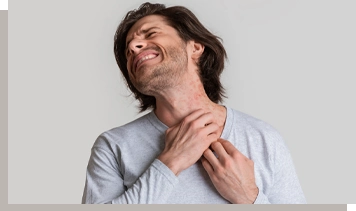
- Dry, itchy skin
- Redness, heating-up, and swelling in the affected area
- Skin eruptions, usually, multiple small ones
- Occasional oozing of thin, watery fluid from the eruptions
- Chronic scratching, which may lead to thickening of the skin in the affected area
- Darkening of skin in long-standing cases
- Crust formation
- Flaking
Eczema skin lesions are a common symptom. They may cause rashes, pimples, cysts, blisters, pus-filled sacs, swelling, discolorations, hardening, or any other change in or on your skin. Lesions can form everywhere on the body, however, the following regions are where these eczema symptoms are most commonly observed:
Knees, Elbows, Ankles (especially on the inner sides)
Arms & legs
Face & neck
Folds of the skin
Types of Eczema
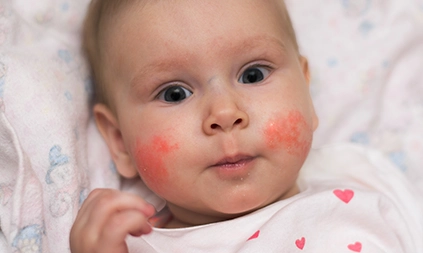
Atopic Dermatitis
This is the most common type of eczema, affecting around 10-20% of children and 1-3% of adults. It is often hereditary and often accompanied by other allergic conditions such as asthma and hay fever.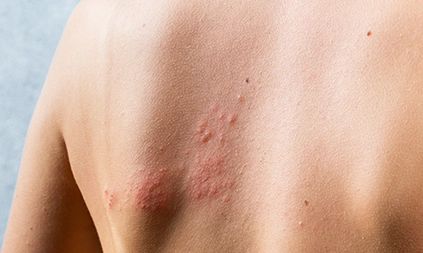
contact Dermatitis
This type of eczema occurs as a result of direct contact with an irritant or allergen. It can be either irritant or allergic in nature. Affects around 7% of the population.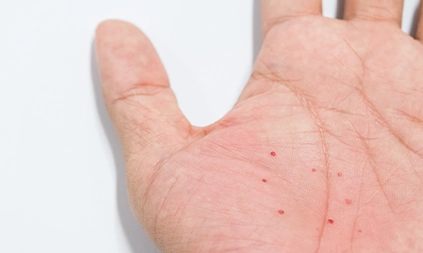
Atopic Dermatitis
This type of eczema is characterized by small, itchy blisters on the hands and feet. Affects around 3% of people.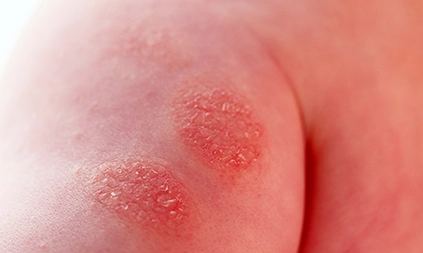
Nummular Eczema
This type of eczema is characterized by coin-shaped patches of itchy, scaly skin. Affects around 2% of people.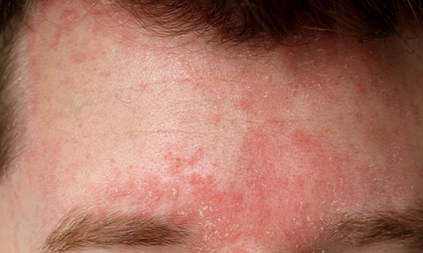
Seborrheic Dermatitis
This type of eczema is characterized by scaly, itchy patches on the scalp, face, and other oily areas of the body. Affects around 3% of people.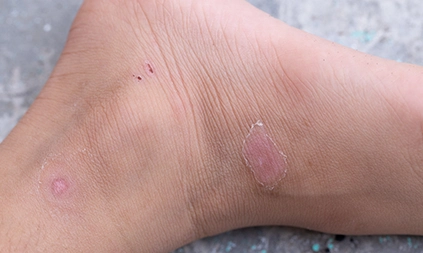
Stasis Dermatitis
This type of eczema is caused by poor circulation in the legs and is characterized by itching, scaling, and thickening of the skin on the lower legs. Affects around 1% of people.Who Should Get Eczema Treatment?
Eczema treatment is recommended for anyone experiencing persistent symptoms like intense itching, redness, or skin irritation that disrupt daily life. If you've tried conventional treatments without significant improvement or find that flare-ups keep returning, Dr. Batra's homeopathic approach can be an ideal solution for you. Our treatment focuses on long-term relief by addressing the root causes of eczema, not just its symptoms, and this is a much more comprehensive approach to managing the condition.
The holistic, side-effect-free nature of homeopathic medicine makes it a safe choice for all age groups, including children and adults with chronic or severe eczema. At Dr. Batra’s, our team of Eczema specialists customize their treatment plan for your specific needs, helping you regain comfort and confidence in your skin. The best part, since our treatment is completley natural, you won’t need to worry about long-term side effects.
Conclusion
Eczema can be hard to deal with, but the right treatment can make a big difference. Dr. Batra’s team of experts in Dubai and Abu Dhabi are able to offer a safe and natural way to treat eczema from its root causes, helping you control its symptoms and improve your overall skin health in the long term. We focus on the unique needs and triggers of each patient, so you can be confident that your treatment plan is customized for you.
Dr. Batra’s holistic treatment works to calm your skin and reduce flare-ups over time. Start your journey to healthier skin by booking a consultation with our expert team today.




